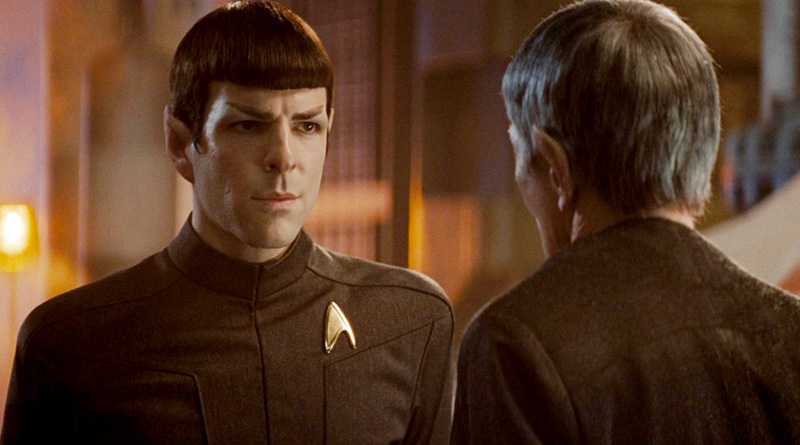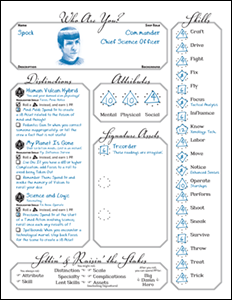Firefly Friday: Spock
It’s Friday again, and I can just imagine the excitement in your eyes as you crack open this week’s Firefly Friday! Excitement, however, in the face of something expected and routine, is illogical. Nevertheless, the data contained herein will be of dramatic import on your dice and story simulations. Our case study this week will be on the imperturbable Spock. Specifically, as you will see from his Distinctions, the Spock from the Kelvin timeline. (spoilers contained from here on out – just in case you somehow missed the recent Action! Lensflare! films)
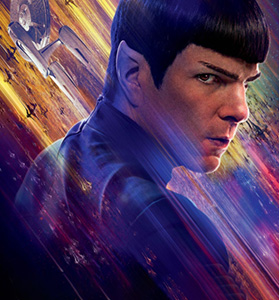 After Samus, you might be tempted to think, “another half human?” – and you’d be correct. Despite his mother’s contribution to his DNA however, Spock retains his copper-based hemocyanin, his Vulcan strength and speed, and Vulcans’ characteristic minor telepathic abilities. Aside from those distinctive physical traits, Spock also exhibits what Star Trek fans immediately recognize as Vulcan mental conditioning. Certain Star Trek fans, such as myself, will recognize Spock’s emotional, social, and sensory particulars as something intensely human.
After Samus, you might be tempted to think, “another half human?” – and you’d be correct. Despite his mother’s contribution to his DNA however, Spock retains his copper-based hemocyanin, his Vulcan strength and speed, and Vulcans’ characteristic minor telepathic abilities. Aside from those distinctive physical traits, Spock also exhibits what Star Trek fans immediately recognize as Vulcan mental conditioning. Certain Star Trek fans, such as myself, will recognize Spock’s emotional, social, and sensory particulars as something intensely human.
Spock is, intentionally or not, heavily coded as autistic. As an autistic person myself, I find this kind of representation in popular media fantastic. And as we get into this, I’ll explore how to mix a couple of Spock’s Distinction Triggers as a possible Autistic Distinction on its own.
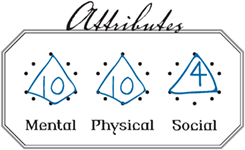 So I teased last week that we’ll be examining another point of differentiation (aside from the already rich tableau of Distinctions, Triggers, Signature Assets, and Signatures). And, I described in the very first week how I work to choose Attributes for character concepts. Well, what happens if your character concept really has two stand-out Attributes that you think deserve that snazzy d10? Well, there are two ways to pull that off – you can spend episodes to adjust your Attributes after some play – or you can sit down with your GM and ask them to bend the character creation rules. And for a character who’s literally not human, that makes a lot of sense.
So I teased last week that we’ll be examining another point of differentiation (aside from the already rich tableau of Distinctions, Triggers, Signature Assets, and Signatures). And, I described in the very first week how I work to choose Attributes for character concepts. Well, what happens if your character concept really has two stand-out Attributes that you think deserve that snazzy d10? Well, there are two ways to pull that off – you can spend episodes to adjust your Attributes after some play – or you can sit down with your GM and ask them to bend the character creation rules. And for a character who’s literally not human, that makes a lot of sense.
In this case, Spock’s Mental and Physical Attributes are both exceptional. And, in many ways that are all too familiar to myself, his Social interactions fall flat. He’s managed to rise to Commander, not through force of personality, but through instructing at Starfleet. Spock’s romantic interactions display exactly how far his own perceptions differ from Uhura’s, in respect to some of those subtle communications they share.
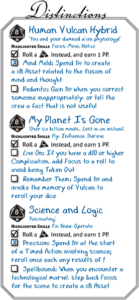 Two of these Distinctions are clearly shared by Spock Prime and post-Kelvin Spock – Human Vulcan Hybrid (thanks Ambassador Sarek and Amanda Grayson), and Science and Logic. However, one of the most traumatic things that could happen to a living being dramatically shapes the person that Spock becomes, and clearly deserves a Distinction – in fact, My Planet Is Gone will persist through more than just the first film. Eventually, a crew-bonding Distinction may replace it – possibly at the exact moment Spock receives that box of Spock Prime’s memorabilia.
Two of these Distinctions are clearly shared by Spock Prime and post-Kelvin Spock – Human Vulcan Hybrid (thanks Ambassador Sarek and Amanda Grayson), and Science and Logic. However, one of the most traumatic things that could happen to a living being dramatically shapes the person that Spock becomes, and clearly deserves a Distinction – in fact, My Planet Is Gone will persist through more than just the first film. Eventually, a crew-bonding Distinction may replace it – possibly at the exact moment Spock receives that box of Spock Prime’s memorabilia.
Like I mentioned earlier, let’s look at how we can build an Autistic Distinction. Now, keeping with my love of flavoring generic Distinctions, this could become anything ranging from Allistics Make No Sense to Spectrum Superpowers to Stimming Is Life. Anyway, so grab that Pedantic from Human Vulcan Hybrid and stick it together with Spellbound from Science and Logic. Boom. Massage Spellbound to be Special Interests, with possibly a different activation condition than “technological marvel” (though trust me, that works too).
Honestly, there are a lot of different Triggers that work here. If you’re not familiar with it, autism actually carries a bunch of positive traits to offset the sensationalized version you might get presented through mainstream. It’s a perfect example of the two-edged sword that Distinctions embody. Everyone’s different though. I for one, have weirdly sharp senses – I can smell an extinguished cigarette from a block away, or hear the electric whine of TurboBoost kicking in on my laptop. I can read an entire page of a book at a glance (except then I process it as a mosaic patchwork, so it takes me almost as long as neurotypicals to effectively get through it).
I’m not going to get into the ethics of playing an autistic character if you aren’t yourself on the spectrum. There’s a lot to be said about exploring – through roleplaying characters unlike yourself – marginalized traits. My big advice here is to approach it with compassion, understanding, and an open mind. Other Distinctions from the official source material share similar ethical concerns, like Blind, Invalid, Leaky Brainpan, etc.
Play responsibly. And… Live long and prosper.

